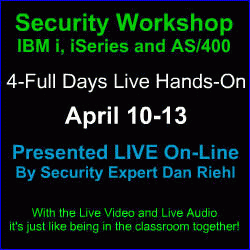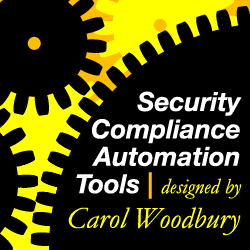
|
|
December 20, 2011 - Vol 1, Issue 6
|

|


|
Feature Article
The Problem With Too Many IBM i Private Authorities
By Dan Riehl
When an object is created, it is owned by either the user that created the object or by the user's primary group profile. Ownership depends on the OWNER attribute of the user profile. If the value is set to OWNER(*GRPPRF), objects created are owned by the user's primary group, if OWNER(*USRPRF) is specified, objects are owned by the user, not the group.
To view objects owned by a user profile you can use the command:
WRKOBJOWN USRPRF(DRIEHL)
In addition to ownership, a user can be assigned explicit private authority to an object using the command GRTOBJAUT(Grant Object Authority), or by adding a user from the EDTOBJAUT(Edit Object Authority) display.
Normally, we want to avoid adding private authorities to an object. We typically want all of our User objects to be secured by an authorization list containing group profile names, and not individual user names.
Once we start down the path of assigning private authorities at the user level, rather than at the group profile level, we begin to build an overly complex security scheme that will require constant maintenance as users come and go. Using Authorization Lists and Group Profiles in our authorization settings provides the least complex configuration, and requires the least amount of on-going maintenance. We do not have to make additions and changes every time a new user is added, or when a user's job function changes. In those cases, we simply assign the user to the correct group profile.
Read More.
|
In This Issue
Featured Article - Too many Private Authorities
Featured Video - Misconceptions - Limited Capabilities
Security Shorts - Stop Adoption of Authority
Industry News and Calendar
Security Resources
Quick Links
SecureMyi Website
Security Training from The 400 School
SecureMyi Newsletter Home and Archives
Please Visit Our Sponsors
Platinum Sponsor
The 400 School, Inc
Gold Sponsors
Skyview Partners, Inc.
|
IBM i Security and Audit Resources
Free Security Videos from Securemyi.com
IBM i Security Reference - IBM i 6.1
IBM i Security Reference - IBM i 7.1
PCI SSC Data Security Standards
COBIT Framework - ISACA
HIPAA Resources
HITECH Enforcement
CISSP - Certification



|


|
IBM i Security News Bytes
Raz-Lee's iSecurity Now Supports QSH and PASE Logging, Reporting & Alerting.
Logging of these environments is unique to iSecurity. Standard IBM 'CD' Command-string entries can now be written to QAUDJRN for command events in PASE and QSH.
More information on this added iSecurity Capability
IBM i and i5/OS Security and Compliance- A Practical Guide
This great book by Carol Woodbury is now available at The MC|Press Bookstore
Get your copy of the book online
Congratulations to Jeff A. of Indianapolis
Jeff won our "New Subscriber" prize of a $500 Best Buy Gift Card.
Just in time for the holidays.
The 400 School, Inc. and SecureMyi.com
Live Online Security Workshop from The 400 School and SecureMyi.com
Dan Riehl presents his 4-Day Live Online Hands-on Security Workshop for the IBM i
Jan 17-20, 2012. Very limited seating. Register early to reserve your seat in the class.
IBM i Security Calendar of Events
Live Security Webcasts for IBM i
Natural Security - Lean and Practical Approaches to Security Projects
Presented by RJS Software Systems
January 12 - 11:00 a.m. CST
More Information and Register to Attend
Automating IBM i Security Administration Tasks including Compliance
with Carol Woodbury - Sponsored by Skyview Partners
January 25 - 10:00 a.m. PST
More Information and Register to Attend
More Security Events
Jan 17-20 - The 400 School - Live Online Security Workshop
May 6-9 - COMMON-A User Group - Annual Conference and Expo - Anaheim, CA
|


|
Featured YouTube Educational Video
IBM i Security
Popular Misconceptions on User Limited Capabilities

|
Security Shorts
Stop Adoption of Authority in the Calling Program
IBM has provided the MI built-in function MODINVAU to modify the adopted authority attributes of a program's invocation level. In effect, it allows you to control the propagation of adopted authority from within a program.
The MODINVAU function has one argument that can contain one of two values:
- Hex 00 = Don't suppress adopted authority
- Hex 01 = Suppress adopted authority
If '00' is specified, normal propagation of adopted authority to called programs and subprograms occurs. If '01' is specified, adopted authority is not propagated to called programs and subprograms. Here's an example of using the function in a Control Language program.
Pgm
CallPrc Prc( '_MODINVAU' ) Parm(x'01')
/* Suppress Adopted Aut */
Go Main
EndPgm
This simple program uses the MODINVAU function to flip the invocation authority switch so that any adopted authority is not propagated to subsequent programs. In this case, the program takes us to the menu name MAIN, and adopted authority is not in effect at the MAIN menu. When we exit from the MAIN menu by using F3, we return to the calling program, where any adopted authority is still in effect.
I suggest using this MI function in your application development to achieve more granular control over adopted authority. If a program needs adopted authority, create the program to adopt. But then also use the MODINVAU function to block the adopted authority from traveling down the stack to other programs. It's a much more elegant design than trying to take control of all programs by using the USEADPAUT(Use Adopted Autority) program attribute.
If your adopting programs don't pass on their adopted authority, many security issues can be alleviated.
You can read more about MODINVAU in the IBM Information Center article on MODINVAU.
|
Sponsored Links
Expert Level Security Consulting
IT Security and Compliance Group, LLC
In Depth Security Assessment of IBM i
Upgrade to QSECURITY level 40 or 50
Forensic Research and Analysis
Audit Assistance and Remediation
Security Training for IT and Audit Staff
Security Software Selection & Configuration
Customized Security/System Programming
Live Online Hands-On Workshops
Now Accepting Credit Cards
Expanded Security Workshop-Jan 17-20
Interactive COBOL Programming - Jan 23-27
Sys Operations Workshops - Feb 27-Mar 2
Sys Administration and Control - Mar 12-16
Interactive RPG IV Programming - Mar 26-30

|

|













